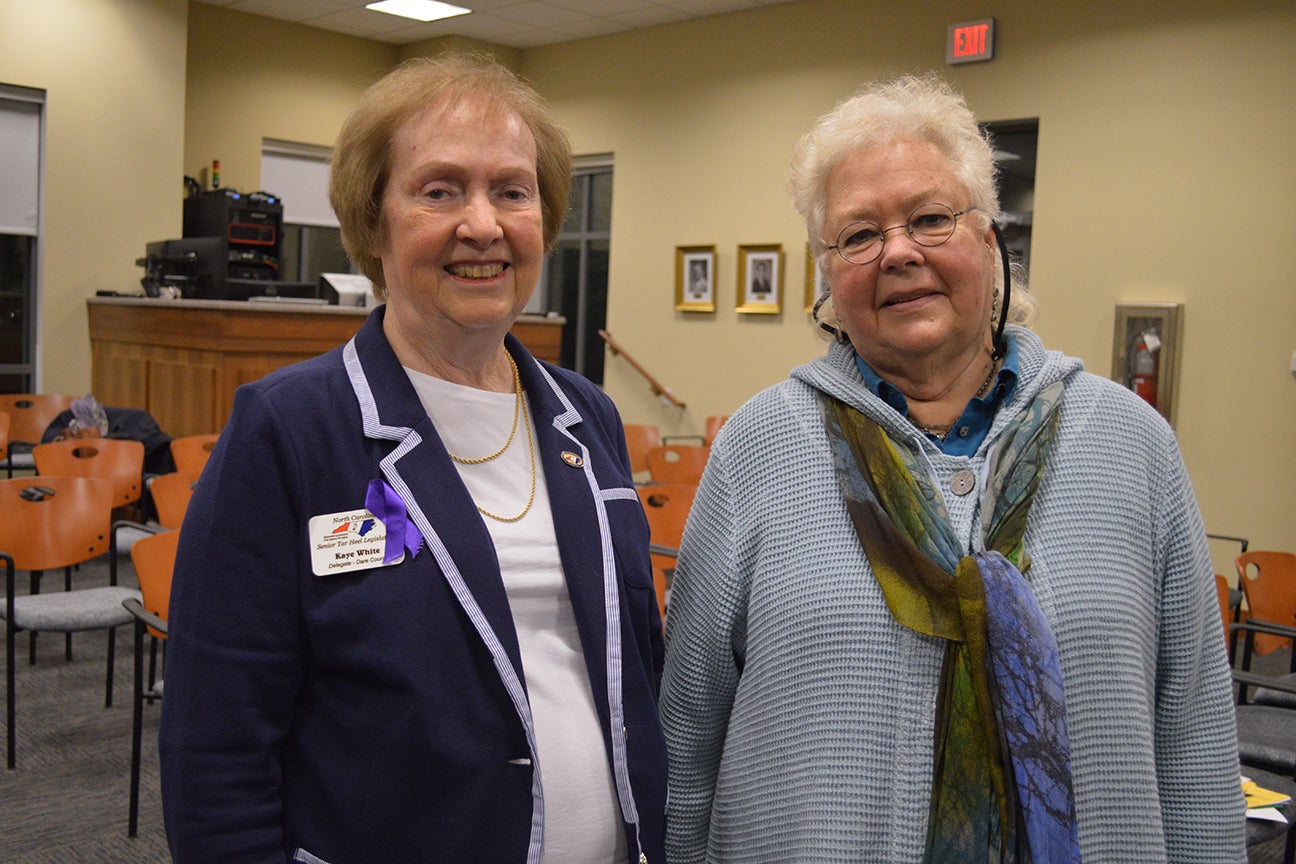Legislative priorities for seniors detailed
Published 9:50 am Thursday, January 30, 2020

- Kaye White, left, and Sue Kelly presented a report about the Tar Heel Senior Legislature to the Dare County Board of Commissioners on Jan. 21. White is the county’s delegate, a position held for 10 years. She also chairs the organization’s friends group. Kelly is the county’s newly appointed alternate. The Senior Tar Heel Legislature was created by the General Assembly in 1993. Mary Helen Goodloe-Murphy photo
“The aging population in the country and especially in North Carolina is growing,” Kaye White told the Dare County commissioners.
Nationally, the state ranks ninth in total population and in persons 65 and older. In five years, one in five North Carolinians will be 65 or older. By 2035, the numbers of those in the age bracket 70 to 80 years will have increased 100%, “creating huge challenges for long-term care services,” said White.
White has served as Dare County’s delegate to the Senior Tar Heel Legislature for 10 years. For six of those years, she has served as chair of the organization’s Friends group and last year received a certificate acknowledging her service.
Each year, White appears before the Dare County Board of Commissioners to brief the board on the activities of the Senior Tar Heel Legislature, whose “purpose is to advocate for older residents of North Carolina.”
During the presentation, White catalogued General Assembly actions in 2019.
Sue Kelly, Dare County’s new alternate delegate to the senior legislature, presented the 2020 legislative priorities set out by the senior advocates:
– Increase funding for the Home and Community Care Block Grant by $7 million recurring. This grant program is “vital in assuring the availability of cost-effective home and community-based services to the elderly, malnourished, homebound, dependent and those who are socially and economically needy,” states a document before the commissioners. About 10,000 North Carolinians are waited listed for these services.
– Maintain and increase funding for senior centers by $350,000 recurring. Some 171 senior centers in 97 counties provide programs and services to enhance the health and wellness of older adults. A significant benefit of senior centers is combating loneliness and isolation in older Americans. The average age of those attending senior centers is 72.5 years.
– Increase funding for Project C.A.R.E. in 2019-2020 by $500,000 and in future years increase funding by ten percent annually for expected growth. Project C.A.R.E. (Caregiver Alternatives to Running on Empty) was developed by recommendation of a statewide, multi-stakeholder task force to address Alzheimer’s disease and related dementias. The program provides caregiver support, care management and referrals to available services. It has become a national best practice model for providing respite services to family members who are caring at home for a loved one with Alzheimer’s disease or related dementia. The program is currently funded at $1 million.
– Strengthen and fund North Carolina’s Adult Protective Services Program by making available $7 million in recurring funds and conduct comprehensive evaluation/review of these services to ensure this protection is adequate. In fiscal year 2018, county departments of social services received 30,128 protective services reports alleging the abuse, neglect or exploitation of vulnerable adults. In the preceding fiscal years, North Carolina counties spent about $23.5 million, 3% state, 79% county, 18% federal, for the providing adult protective services. The only state funding specifically for these services was eliminated in 2012, states the agenda document.
– Address staff-to-patient ratios in nursing homes by General Assembly action to establish either a mandatory standardized HPPD (hours per patient daily) or minimum staff-to-patient ratios for direct patient care, including enforcement standards and consequences to ensure quality care in nursing homes in the state of North Carolina, regardless of whether they are a for-profit or non-profit organization.
Federal legislation in 1987 required minimal staffing levels for registered nurses (RNs) and licensed practical nurses (LPNs) and minimal education standards for nurse’s aides (NAs). That legislation fails to provide a minimum standard ratio for direct patient care or number of hours per day for adequate one-on-one care.
Kelly concluded her presentation with “it’s obvious aging is going to mean more demands on our population and on our elected government.”
Commissioner Jim Tobin commented that assisted living facilities also needed similar staff-to-patient standards. He said that more and more dementia and Alzheimer’s disease patients are being blended into the general population in facilities because the Alzheimer’s units do not have capacity. He said Alzheimer’s patients need a lot more direct care.
READ ABOUT MORE NEWS AND EVENTS HERE.
RECENT HEADLINES:
‘They Came From Hyde:’ Collection documents history of nearly 500 WWII veterans





